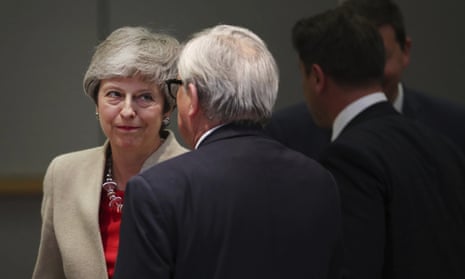Theresa May has blamed the failure to deliver Brexit for the Conservative party’s disastrous European election results in her first public appearance since announcing her resignation as prime minister, but cautioned against leaving the EU without a deal.
At a meeting of EU leaders in Brussels, May said she hoped her successor would find a “consensus” in parliament that could take the UK out of the bloc with an agreement with the other 27 member states.
She declined to comment directly on the claims by some of those seeking to replace her, including the former foreign secretary Boris Johnson and the former Brexit secretary Dominic Raab, who say the UK should leave on 31 October with or without a deal.
May emphasised the need for the next prime minister to gain the support of parliament, which has previously voted to block an exit without an agreement with Brussels.
She said: “While I’ve been prime minister, I’ve been to something like 15 meetings or more and, in every one of those, I’ve been working hard to negotiate the best possible deal for the UK in leaving the European Union and it’s a matter of great regret to me that I haven’t been able to deliver Brexit.
The Brexit divide: Britain's EU election earthquake
“But of course that matter is for my successor and they will have to find a way of addressing the very strongly held views on both sides of this issue. To do that and to get a majority in parliament, as I said on Friday, I think will require compromise.
“I’ve always taken a view that the best option for the UK is to leave the European Union with a deal. I’m not going to comment on the views of individual candidates. There will be a process of selecting my successor as leader of the Conservative party but I continue to have the view that it’s best for the UK to leave with a deal.”
Later on Tuesday, Donald Tusk, the European council president, described Brexit as “a vaccine against anti-EU propaganda and fake news” that encouraged voters across the continent to elect a pro-EU majority in the European elections.
Hailing the first increase in turnout in 25 years, Tusk said Eurosceptic parties had “abandoned their anti-EU slogans and presented themselves as reformists” following the British experience.
“I have no doubt that one of the reasons why people of the continent voted for a pro-European majority is also Brexit,” Tusk told journalists. “As Europeans see what Brexit means in practice, they also draw conclusions. Brexit has been a vaccine against anti-EU propaganda and fake news.”
Tusk was speaking at the end of a special EU summit to launch the process of finding a new batch of EU leaders. Brexit was not on the agenda, but asked about the ongoing Tory leadership race and pledges to renegotiate the deal, Tusk said there was “nothing promising” in “the state of affairs in London”.
Earlier, before a meeting with May, the European commission president, Jean-Claude Juncker, dismissed the claim made by many of the Tory leadership challengers that they would renegotiate the withdrawal agreement on becoming prime minister. “I will have a short meeting with Theresa May but I was crystal clear there will be no renegotiation,” he said.
The Dutch prime minister, Mark Rutte, said May would receive “lots of kisses” from her fellow leaders but that there would be no further negotiations with the UK unless the government changed its red lines, in a reference to the EU’s openness to a customs union.
The Tory party suffered its worst set of results in last week’s European elections, winning just four seats.
May resigned the day after voters went to the polls after her last-ditch attempt to get her withdrawal agreement through was blocked by the cabinet, who were concerned by her offer of a parliamentary vote on a second referendum.
“Of course the European election results were deeply disappointing for the party,” May said. “What it shows is the importance of actually delivering Brexit. I think the best way of doing that is with a deal but it will be for my successor and for parliament to find a way forward to get a consensus and I hope that those election results will focus parliament on the need to deliver Brexit.”
The Brexit party won 29 seats, making it the joint largest party in the European parliament, but the second-biggest winner in the UK’s elections were the Liberal Democrats with 16 seats, up from a single seat five years ago.
The party’s leader, Vince Cable, who was in Brussels to meet eight prime ministers whose parties sit in the same liberal political group in the parliament, suggested he had the backing from the other leaders to push for a second referendum.
He said: “They’re very keen that Britain remains because of the liberal contribution and I briefed them on what’s happening in British politics and I said there’s every reason to expect that we’re going to stay, that we’re not leaving at the end of October.”
